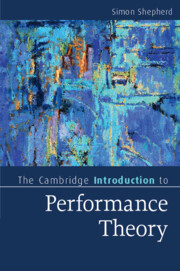Book contents
- Frontmatter
- Contents
- Preface
- Part I Definitions of performance
- 1 Sociology and the rituals of interaction
- 2 Theatre, ceremony and everyday life
- 3 Ethnography, folklore and communicative events
- 4 Cultural performance, social drama and liminality
- 5 Performance as a new sort of knowledge
- Part II The emergence of performance as sensuous practice
- Part III Theorising performance
- Closing note
- References
- Index
- Cambridge Introductions to …
3 - Ethnography, folklore and communicative events
from Part I - Definitions of performance
Published online by Cambridge University Press: 05 February 2016
- Frontmatter
- Contents
- Preface
- Part I Definitions of performance
- 1 Sociology and the rituals of interaction
- 2 Theatre, ceremony and everyday life
- 3 Ethnography, folklore and communicative events
- 4 Cultural performance, social drama and liminality
- 5 Performance as a new sort of knowledge
- Part II The emergence of performance as sensuous practice
- Part III Theorising performance
- Closing note
- References
- Index
- Cambridge Introductions to …
Summary
Between them Chicago sociology and French sociological theatre studies extended the range of what could be considered to be performed human behaviour. In order to think about this activity, they initially drew analogies from aesthetic theatre, but this work was then moved away from explicit theatrical models by the Centre for Contemporary Cultural Studies at the University of Birmingham's (CCCS) study of culture as text and by Burns's work on conventions. While this all began to put in place an object of study that was neither theatre nor everyday behaviour, it tended not to be called ‘performance’. The development of the use of that term came instead from elsewhere, from a specific branch of ethnography which studied folklore. ‘During the past quarter century’, said William Hugh Jansen, in 1957, ‘there has been growing concern among folklorists about a rather imponderable quantity called performance – particularly performance of the folktale and folksong.’ In order to make it somewhat less imponderable Jansen proposed a system for classifying the performance of verbal folklore. He also recommended that, in addition to the study of the content of folklore, ‘there should be more consideration of the manner of folklore, of that dual but inseparable process of performance and reception.’ In making this recommendation he was at the same time extending what might be meant by the word ‘performance’. He acknowledges that in speaking of oral verbal folklore ‘one must employ the term performance in something like its theatrical or dramatic definition’, but then he notes that folklore compels a new application of the word:
the element that I can find no term for except performance does not exist until the ‘doer,’ the speaker, or the reciter of the bit of folklore steps outside himself as an individual and assumes a pose toward his audience, however small, that differs from his everyday, every-hour-in-the-day relationship to the same audience. Integral in this posing is a purpose. The poser is as poser a teacher, a monitor, or an entertainer; he may be any one or any combination of the three.
From here Jansen offers some illustrative situations showing the potential range across what we might call performance's functions as efficacy and entertainment, and he then suggests ‘three ways to weigh the degree of performance or the anticipation of performance’: the form of the performed item, its particular function, the actual performer (Jansen 1957: 110, 112–13).
Information
- Type
- Chapter
- Information
- The Cambridge Introduction to Performance Theory , pp. 33 - 41Publisher: Cambridge University PressPrint publication year: 2016
